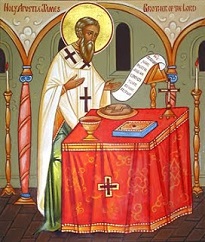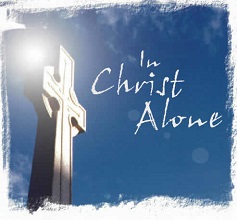Throughout history, many churches have utilized liturgical services, where both the order and much of the content of a worship service is written out in full. This hymn comes from one of these service orders, the Liturgy of Saint James, a liturgy for celebrating the Eucharist that originated with the church at Jerusalem, dating back to at least the 4th Century. It is named for James, the brother of Christ, author of the New Testament Epistle bearing his name, and the first bishop of the Jerusalem church. Some of the eastern churches still use this liturgy today.
The first part of this liturgical service was open to anyone, including those who might just be investigating Christianity, as well as those who had accepted the claims of Christianity but had not yet been baptized. Like our own service, this first part included hymns, prayers, the reading of Scripture, and instruction from the Word. However, as they prepared to partake of the Communion elements, the catechumens, or unbaptized, would be dismissed, and the choir would chant this hymn as the bread and the wine were brought in to be placed on the altar:
“Let all mortal flesh be silent, and stand with fear and trembling, and meditate nothing earthly within itself. For the King of kings and Lord of lords, Christ our God, comes forward to be sacrificed, and to be given for food to the faithful; and the bands of angels go before Him with every power and dominion, the many-eyed cherubim, and the six-winged seraphim, covering their faces, and crying aloud the hymn, Alleluia, Alleluia, Alleluia.”
The first phrase echoes Habakkuk 2:20, which says, “the LORD is in his holy temple: let all the earth keep silence before him.” It brings to mind Isaiah chapter 6, where Isaiah sees the Lord on his throne, surrounded by the seraphim, and Isaiah responds with fear and trembling. Or, the last few chapters of Job, where God “answers” Job with questions that reveal God’s surpassing greatness and authority, and Job’s response is to “lay his hand on his mouth.”
So there is a somberness to these words that we sing, as we ponder our own sinfulness, our need for a Savior, and we rightfully tremble before the power and authority of our Creator. However, silence before God is not only due to standing before Him with fear and trembling, but also because we have no need to fret or worry. As the psalmist wrote in Psalm 46:10, “Be still, and know that I am God.” If we are God’s children, we can have internal peace, and be calm and silent when we see God for who He is. We also sing with rejoicing in our hearts, because we are celebrating the arrival of our glorious Savior.
Perhaps especially meaningful for the church at Jerusalem would have been the prophecy from Zechariah chapter 2, where verses 10-13 read, “‘Sing and rejoice, O daughter of Zion, for behold, I come and I will dwell in your midst, declares the LORD. And many nations shall join themselves to the LORD in that day, and shall be my people. And I will dwell in your midst, and you shall know that the LORD of hosts has sent me to you. And the LORD will inherit Judah as his portion in the holy land, and will again choose Jerusalem.’ Be silent, all flesh, before the LORD, for he has roused himself from his holy dwelling.”
And so, we sing this classic hymn, not just imitating traditions of the past, but standing alongside the saints from throughout history, unified in our doctrine and our devotion. Let us stand, and with a holy mixture of fear and joy, give homage to our Lord who came to redeem us and nourish us by giving us himself.

